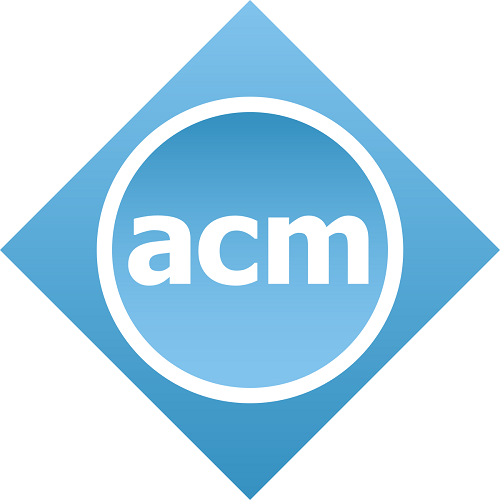New York, June 18, 2024 – ACM, the Association for Computing Machinery, today announced the recipients of four technical awards.
They are:
David Blei, Columbia University, receives the ACM – AAAI Allen Newell Award.
Blei is recognized for significant contributions to machine learning, information retrieval, and statistics. His signature accomplishment is in the machine learning area of “topic modeling”, which he pioneered in the foundational paper “Latent Dirichlet Allocation” (LDA). The applications of topic modelling can be found throughout the social, physical, and biological sciences, in areas such as medicine, finance, political science, commerce, and the digital humanities.
Blei has also been a leader in variational inference (VI), another research area that connects computer science to statistics. VI is an optimization-based methodology for approximate probabilistic inference. Blei’s major contribution to VI has been to develop a novel framework—stochastic variational inference (SVI)—that yielded a quantum leap in the size of problems that can be solved with VI. SVI is in wide use in the AI industry and across the sciences.
Additionally, in his work on discrete choice modelling, Blei has developed a methodology for answering counterfactual queries about changes in prices, which helps to identify complimentary and substitutable pairs of products. This work has built a bridge between computer science and econometrics and has been cited for its impactful use of machine learning modeling.
The ACM – AAAI Allen Newell Award is presented to an individual selected for career contributions that have breadth within computer science, or that bridge computer science and other disciplines. The Newell award is accompanied by a prize of $10,000, provided by ACM and the Association for the Advancement of Artificial Intelligence (AAAI), and by individual contributions.
Guy E. Blelloch, Carnegie Mellon University; Laxman Dhulipala, University of Maryland; and Julian Shun, Massachusetts Institute of Technology, receive the ACM Paris Kanellakis Theory and Practice Award for contributions to algorithm engineering, including the Ligra, GBBS, and Aspen frameworks which revolutionized large-scale graph processing on shared-memory machines.
Beginning in 2013, Blelloch, Dhulipala and Shun began to explore how to analyze huge graphs (billions of vertices and hundreds of billions of edges) on relatively inexpensive shared-memory multiprocessors. They built several frameworks (Ligra, Ligra +, Julienne, GBBS, and Aspen) that make it much easier for programmers to efficiently solve a wide variety of graph problems. They have obtained many truly outstanding results in which their provably efficient algorithms running on an inexpensive multi-core shared-memory machine are faster than any prior algorithms, even those running on much bigger and more expensive machines. Examples of such results include clustering, clique counting, and various forms of connectivity. These ideas and implementations are being used in industry to handle real-world problems and have also had tremendous impact on research in the field.
One important upshot of this work was the paradigm-changing demonstration that shared-memory computers are an ideal platform for analyzing large graphs. At the time Ligra was first developed, the predominant approach used to analyze large graphs was distributed systems such as Pregel (developed by Google). This was overturned when, for many important large real-world graph problems, the Ligra approach turned out to be much more efficient in terms of energy, cost, and end-to-end running time.
Their work on graph processing also allows algorithms with provable performance guarantees in the PRAM model to live up to their theoretical performance in practice. Recently, the nominees addressed the emerging setting of processing streaming graphs, which models graphs that change in real time and developed Aspen, a novel graph streaming system that uses new purely functional data structures to enable low-latency updates and snapshots on massive graph datasets.
The ACM Paris Kanellakis Theory and Practice Award honors specific theoretical accomplishments that have had a significant and demonstrable effect on the practice of computing. This award is accompanied by a prize of $10,000 and is endowed by contributions from the Kanellakis family, with additional financial support provided by ACM’s Special Interest Groups on Algorithms and Computation Theory (SIGACT), Design Automation (SIGDA), Management of Data (SIGMOD), and Programming Languages (SIGPLAN), the ACM SIG Projects Fund, and individual contributions.
Prateek Mittal, Princeton University, is the recipient of the 2023 ACM Grace Murray Hopper Award for foundational contributions to safeguarding Internet privacy and security using a cross-layer approach. The theme in Mittal’s research is to leverage foundational techniques from network science, comprising graph-theoretical mechanics, data mining, and inferential modeling for tackling privacy and security challenges. For example, his research orchestrates and exploits graph-theoretic properties of the Internet topology for protecting privacy and detecting attacks. Moreover, Mittal applies these techniques in a manner that allows for complex interactions across traditional layers and boundaries of our networked systems, i.e., a cross-layer approach.
By conducting Internet-scale experiments with over 50,000 routers, Mittal’s research showed that an adversary can exploit the insecurity of internet routing to intercept traffic from trusted certificate authorities, and then allow an adversary to obtain a cryptographic key that is vouch safe by trusted authorities. To mitigate these attacks, Mittal helped develop the ingenuous idea of trusted certificate authorities validating website domain ownership from multiple vantage points on the Internet. This technology has already led to the secure issuance of over 2.5 billion digital certificates used by 350 million websites. Taken together, his contributions are impacting the privacy and integrity of global commerce, financial services, online healthcare, and everyday communications.
The ACM Grace Murray Hopper Award is given to the outstanding young computer professional of the year, selected on the basis of a single recent major technical or service contribution. This award is accompanied by a prize of $35,000. The candidate must have been 35 years of age or less at the time the qualifying contribution was made. Financial support for this award is provided by Microsoft.
Andrew S. Tanenbaum, Vrije Universiteit, received the ACM Software System Award for MINIX, which influenced the teaching of 0perating systems principles to multiple generations of students and contributed to the design of widely used operating systems, including Linux.
Tanenbaum created MINIX 1.0 in 1987 to accompany his textbook, “Operating Systems: Design and Implementation.” MINIX was a small microkernel-based UNIX operating system for the IBM PC, which was popular at the time. It was roughly 12,000 lines of code, and in addition to the microkernel, included a memory manager, file system and core UNIX utility programs. It became free open-source software in 2000.
Beyond enabling the success of Tanenbaum’s textbook, the impact of MINIX has been phenomenal. It was an inspiration for LINUX, which has grown into the most successful open-source operating system powering cloud servers, mobile phones and IoT devices. MINIX was also the basis for the MeikOS operating system for Meikotransputer-based computers and runs inside popular microchips. A later version of MINIX, MINIX 3.0 is intended for resource-limited and embedded computers and for applications requiring high reliability. Beyond the direct impact of MINIX, Tanenbaum’s advocacy for microkernel design has impacted generations of operating system designers.
The ACM Software System Award is presented to an institution or individual(s) recognized for developing a software system that has had a lasting influence, reflected in contributions to concepts, in commercial acceptance, or both. The Software System Award carries a prize of $35,000. Financial support for the Software System Award is provided by IBM.
ACM, the Association for Computing Machinery, is the world’s largest educational and scientific computing society, uniting computing educators, researchers, and professionals to inspire dialogue, share resources, and address the field’s challenges. ACM strengthens the computing profession’s collective voice through strong leadership, promotion of the highest standards, and recognition of technical excellence. ACM supports the professional growth of its members by providing opportunities for life-long learning, career development, and professional networking.




